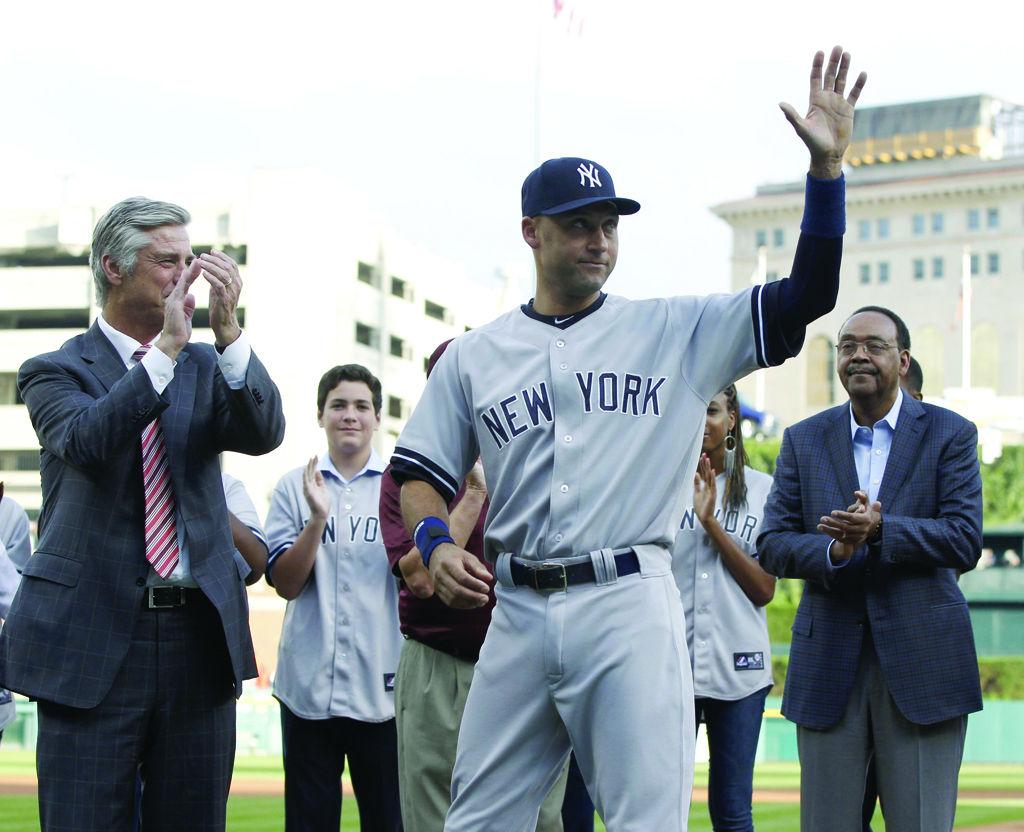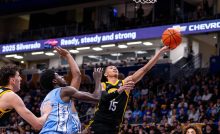Derek Jeter epitomizes the best of Major League Baseball


Last week, Gatorade released an advertisement to pay tribute to the career of longtime endorsement partner Derek Jeter, the legendary Yankee shortstop whose career will draw to a close within the next week. I watched the video for the first time with my roommates, one of whom isn’t a baseball fan. He noticed my reaction — I was apparently noticeably choked up — and asked for an explanation as to what makes Jeter so special, why he’s so celebrated, why opposing organizations give him gifts everywhere he goes.
And I couldn’t articulate an answer.
I fumbled around for a while, stuttered, unable to provide anything concrete. I didn’t know where to begin. But having had a few days to gather my thoughts, I guess I’ll have to start from the beginning and ramble aimlessly from there.
Jeter is one of the main reasons that this generation even slightly still cares about baseball. People have lost appreciation for the art of baseball in an age of hard-hitting, fast-paced, blunt-force-style sports. When I was a kid playing Little League, everybody fought over No. 2. “I play shortstop,” argued any kid with enough coordination to play in the infield in some capacity, without getting drilled in the face with a sharp grounder. “Jeter is my favorite player,” said everybody who’d ever seen him play. I tried, “I’m bigger than all of you,” but the jersey never would’ve fit me anyway.
One year, arguments over jersey No. 2 got so heated that our coach wouldn’t let anybody wear it. He threw the jersey aside, annoyed, and didn’t give it another thought.
There’s always been that type of modest hysteria surrounding Jeter, but his fame hasn’t come in flashes, nor has it been flashy. Instead, Jeter has molded his image — his character, rather — out of consistency and respectability. He was an overnight sensation that never stopped being sensational. It takes an unfathomable work ethic to be a career shortstop, never moving instead to second or third base, and Jeter is one of the few willing to work hard enough to accomplish that feat.
Baseball-wise, we’re not talking about your average fan favorite here. Your fan favorite isn’t a five-time World Series champion with a .300+ lifetime batting average. Your fan favorite hasn’t been an all-star 14 times, nor has he hit safely nearly 3,500 times. And your average fan favorite won’t spend his final MLB season on a farewell tour, accepting guitars, paddleboards, Maryland blue crabs and charitable donations from every other club. These stats, these accolades, these honors are reserved for the legends, living and dead, the brethren of baseball’s eternally beloved.
People adore Jeter, in this generation especially, because he’s baseball’s quintessential professional. He’s the greatest example of somebody who plays the game the way it’s supposed to be played: Work as hard as you can, be the best you can be, and when success comes your way, act like you’ve been there before. Jeter has always been humble, a trait that’s becoming increasingly difficult to find in professional athletes, making it all the more valued when discovered. He’s always been outwardly appreciative of those around him and the support that New York has given him. For nearly 20 years now, Jeter has been the sports world’s reminder that not every athlete is a smack-talking, money-blowing idiot. For that reason alone, the Captain will be sorely missed.
Much has been talked about how Jeter fits in with the rest of the Yankee legends. With the Yankees out of the playoff picture, we have to give ourselves some reason to discuss them, right? Jeter is certainly great in his own right, but where do we place a modern player on a list that includes Babe Ruth, Lou Gehrig, Mickey Mantle, Joe DiMaggio and Roger Maris? How does his legacy compare to those who came before him?
Personally, I don’t find Jeter comparable to his Yankee predecessors. To our generation, Ruth is more myth than substance. We only know of his existence through history books and “The Sandlot.” The majority of us only know Lou Gehrig because we dumped a bucket of ice water on our heads in his name. We know DiMaggio and Mantle could play, everybody’s told us that, but we don’t know anything about them. And old guys always talk about Maris hitting home runs, saying he’s “the one who really deserves the record,” but we know Barry Bonds could destroy him in a home run derby.
The point is that Jeter is the new classic Yankee, the living legend, the one for which we have a face. I’ve seen Jeter play multiple times in person and countless times on television. I’ve seen his highlights, seen his interviews, know his philosophy. To me, Jeter isn’t like the old-timers: a shaky black-and-white film in an empty stadium. He’s a real person, a real player. He’s the face of baseball for our generation. Everybody knows Jeter now just as everybody knew Ruth then. When I’m old, I’ll sit in a chair on my front porch and tell my grandchildren stories about him — “Boy, you shoulda seen that Jeter play, I’ll tell ya … good guy, too, good guy …” — and it’ll mean nothing to them.
In Jeter’s eyes, a tip of the cap and a round of applause would be more than enough. He’s too humble to ask for more. He’s never asked for what he’ll be given, let alone more. But a tip of the cap and a round of applause will never be enough to celebrate all that Jeter has done for New York, for baseball, for sports, for the world.
Cheers, Captain.
Recent Posts
Opinion | School should be in the summer
Although this may be controversial, I believe that from this data, it is evident that…
Weathering the storm: Pittsburgh teams have tackled some of the toughest environments
The end of the year in western Pennsylvania is always marked by two things —…
Notes From an Average Girl // Notes on Book Banning
In this edition of Notes From an Average Girl, senior staff writer Madeline Milchman writes…
To Be Honest // Yup, it is that damn phone
In this edition of To Be Honest, staff writer Evin Verbrugge writes about her phone…
Meaning at the Movies | Portraying Toxic ‘Adolescence’
In this edition of Meaning at the Movies, staff writer Lauren Deaton explores the mini-series…
Opinion | Climate change requires radical, immediate action
Contributing editor Emma Hannan talks about the effects of climate change and the actions cities…

